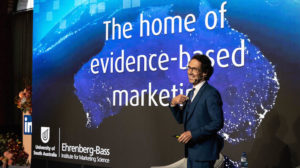Reads & Feeds

- We know creativity matters; doing it well is another thing. Creativity is one of the hardest things to nail as a B2B marketer. Agencies that understand B2B and are willing to work within B2B budgets are near impossible to find. A great read on the lack of creativity in most B2B marketing and a terrific interview with the DocuSign CMO on how they nailed it with Hard Hat.
- 60:40 Rule debunked by Prof Byron Sharp. Well said and argued.
the Internet makes us superficial
Definitely plan to write more on this… Nick points to A recent edition of Science featured a worrying paper by University of Chicago sociologist James A. Evans titled Electronic Publication and the Narrowing of Science and Scholarship.
Seeking to learn more about how research is conducted online, Evans scoured a database of 34 million articles from science journals. He discovered a paradox: as journals begin publishing online, making it easier for researchers to find and search their contents, research tends to become more superficial.
Evans summarizes his findings in a new post on the Britannica Blog:
[My study] showed that as more journals and articles came online, the actual number of them cited in research decreased, and those that were cited tended to be of more recent vintage. This proved true for virtually all fields of science … Moreover, the easy online availability of sources has channeled researcher attention from the periphery to the core—to the most high-status journals. In short, searching online is more efficient, and hyperlinks quickly put researchers in touch with prevailing opinion, but they may also accelerate consensus and narrow the range of findings and ideas grappled with by scholars.
If part of the Carr thesis [in “Is Google Making Us Stupid?”] is that we are lazier online, and if efficiency is laziness (more results for less energy expended), then in professional science and scholarship, researchers yearn to be lazy…they want to produce more for less.
Ironically, my research suggests that one of the chief values of print library research is its poor indexing. Poor indexing—indexing by titles and authors, primarily within journals—likely had the unintended consequence of actually helping the integration of science and scholarship. By drawing researchers into a wider array of articles, print browsing and perusal may have facilitated broader comparisons and scholarship.
Twitter Updates for 2008-03-05
- back in Austin #
Twitter Updates for 2008-02-27
- cool windows tips… https://tinyurl.com/36fgvw #
- @radiowalker starfish have a good rep… major Aus VC… like any good US VC #





